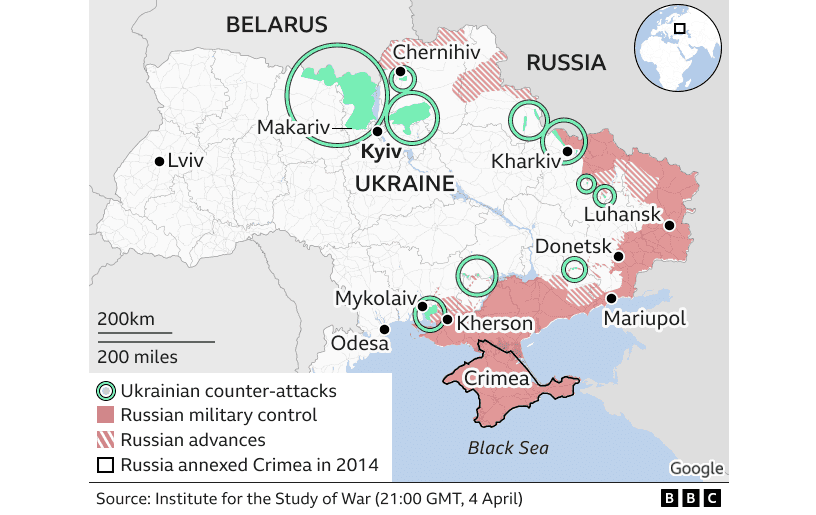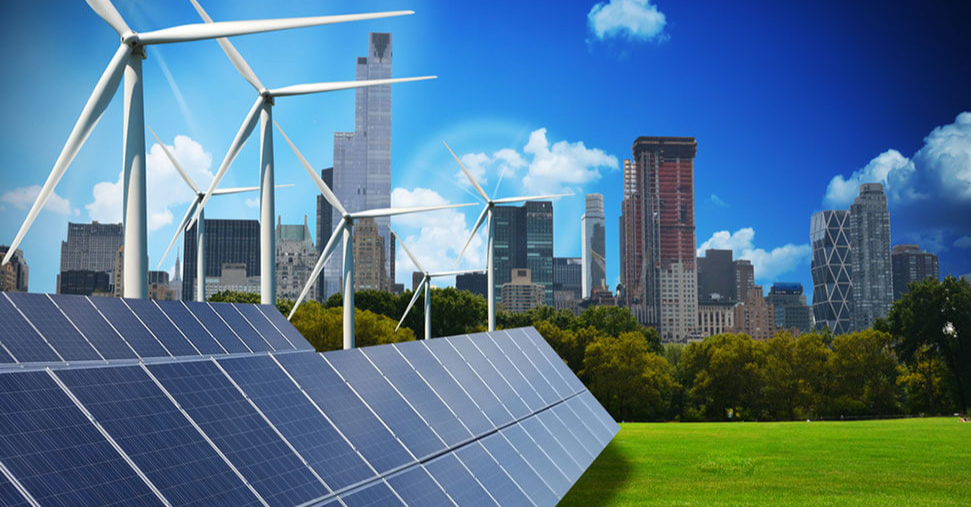Today’s Russia/Ukraine Update

🇺🇦 Russia appears to be shifting its focus and redeploying a significant portion of its troops to eastern and southern Ukraine as the war approaches its seventh week; NATO Secretary-General Jens Stoltenberg predicted that Moscow will attempt to take control of the entire eastern Donbas region over the next few weeks.
- Ukraine cyber officials said they identified 65 different attacks from Russia between March 23 and March 29, which was five times more than in the previous week.
- The US ambassador to the UN introduced a proposal to suspend Russia from the Human Rights Council following a video message from Ukrainian President Volodymyr Zelensky (more on that further down).
- The EU proposed a broad new sanctions package against Russia that includes a blanket ban on coal imports and individual restrictions against oligarchs, including two of Russian President Vladimir Putin’s daughters, sources told the WSJ.
- Sweden, Denmark, Italy and Spain joined Germany and France in expelling dozens of Russian diplomats over reports of civilian killings in Bucha, a town near Kyiv.
How should the world address alleged Russian war crimes?

Sprinkles from the Left
🚀⏰ Ready, Set, Go: These opinions take 1.76 minutes to read.
To argue that the West has no compelling interest in wanting to see [Putin] fall is to pretend that this time, he’ll slink back into his corner and leave the world alone.
This opens the broader question of what else the West can do to accelerate Putin’s exit. Broaching the topic always risks mindless accusations of seeking regime change, as if anyone seriously contemplates deploying the 82nd Airborne to take the Kremlin.
But there is a range of options the West hasn’t yet touched when it comes to Putin. We could turn Russia’s frozen foreign reserves and other assets into an escrow account for Ukrainian reconstruction, rearmament and refugee resettlement. We could counter the Kremlin’s dezinformatsiya campaigns in the West with informational campaigns for Russian citizens, particularly when it comes to highlighting their leaders’ ill-gotten wealth. We could set an ambitious date for placing sanctions on all Russian energy imports. Brussels could invite Kyiv into a formal accession process into the European Union as a sign of moral solidarity.
None of these may be a silver bullet when it comes to toppling Putin’s regime. But regimes that face military defeat, economic impoverishment and global pariahdom — as the Soviet Union did by the mid-1980s and Argentina did after its failure in the Falklands — are the ones likeliest to fall. The task for the Biden administration is to persuade our allies to pursue all three while the horrors of Bucha remain fresh in our minds
[Is] there more that can be done in Ukraine given that Russia has committed atrocity crimes, perhaps including genocide, in Bucha, Mariupol and other parts of Ukraine?
Absolutely.
First, the sanctions on Russia can be further increased. The U.S. and its allies already appear to be preparing to do this in the aftermath of the Bucha revelations. But key actors can do more, including further cutting off Russia’s oil revenue. Germany, in particular, has been hesitant to do so, but its position could shift given the country’s own history of genocide.
Second, key stakeholders can intensify their diplomatic efforts… diplomats need to encourage and pressure nations such as India, Israel and some Arab League countries to join the sanctions against and diplomatic isolation of Russia.
Third, North Atlantic Treaty Organization countries can increase their military aid to Ukraine. Given the threat of nuclear war, direct military intervention is a nonstarter. But NATO members could provide more of the weapons Zelensky has sought, including tanks, missile defense systems, drones and armored personnel vehicles…
But we must not wait to see whether those efforts ultimately deem what’s happening in Ukraine a genocide to decide our actions. The international community has a formal responsibility to protect civilians from precisely the sort of atrocity crimes that Russia is committing in Ukraine. Bucha underscores the importance of acting now

Sprinkles from the Right
🚀⏰ Ready, Set, Go: These opinions take 1.85 minutes to read.
Mr. Putin’s purposes are multifaceted, and he is adaptive. There is more than one way to dominate Ukraine. Under cover of the wider conflict, Mr. Putin is taking full control of Ukraine’s vast, extremely valuable energy assets and intends to integrate them into the Russian supply chain on which Europe now depends. China and India will eventually depend upon it too…
…He’s done this before. Mr. Putin’s annexation of Crimea in 2014 gave him Sevastopol and Ukraine’s exceptionally rich Black Sea assets—a windfall worth hundreds of billions of dollars. He passed these assets to Gazprom and declared an exclusive economic zone in the Black Sea, defended by the Russian navy.
Sadly, Mr. Putin learned from Crimea that the West protests, then forgets. Despite the imposition of sanctions, European Union imports of Russian energy, enhanced by the annexed assets, continued unabated. Europe is now paying Russia more than $100 billion a year, and is on track to import 90% of the energy it consumes by 2030…
Despotic regimes control most of the world’s energy via state companies. The democratic West relies on private companies operating in free markets, which have driven most of the innovation in cleaner fuels, carbon capture, nuclear and hydrogen. As NATO reorients itself, member states should pursue trade deals connecting the vast supply and technological innovations of the U.S. and Canada to Europe. The best way to beat this particular thief is to steal back his market.
Eleven days ago, I thought the crisis was stabilizing and only an accident or another Putin miscalculation might destabilize it again. To Mr. Putin, Bucha probably seems a bit of both.
Then again, containing the crisis may have been illusory all along. Between the lines of the Journal’s excellent deconstruction of how Russia, the West and Ukraine found themselves in their present fix, the driving force was the will and aspiration for 40 million Ukrainians not to live in uncertainty, insecurity and penury as a buffer between the authoritarian Putin and the democratic and law-abiding West, but to live their own lives and develop their own potential as a free and sovereign people.
The West won’t get the crisis right until it allows for this inconvenient reality since this reality is not going away.
We might also draw a tighter bead on why deterrence failed. It failed because of Germany’s inability to do without Russian gas. With the help of former Chancellor Gerhard Schröder and German industry, Mr. Putin knew what he was doing. If one linchpin of his Ukraine plan was to capture Kyiv fast, the other was confidence that Germany would protest impotently and accept a fait accompli. By failing to make quick work of Ukraine, he defeated not only his own strategy but Angela Merkel’s.
I doubt Mr. Putin has any plan in mind now for how to handle the situation if Germany really does turn off the gas. The risks of escalation and miscalculation are again on the rise.
Share this!
Recent Discussion stories

Discussion
| April 4, 2022Mental Health in America
📝🧠 A new CDC analysis published Friday found that more than a third of high school students (37%) said they experienced poor mental health during the Covid pandemic.

Discussion
| April 1, 2022The Future of Energy
🌬️☀️ Wind turbines and solar panels produced over 10% of global electricity last year for the first time in history, according to new research published this week by climate think tank Ember.

Discussion
| March 30, 2022The Role of Standardized Tests in College Admissions
📝 Earlier this week, MIT announced plans to reinstate its requirement that students provide their ACT/SAT scores for future admission.
You've made it this far...
Let's make our relationship official, no 💍 or elaborate proposal required. Learn and stay entertained, for free.👇
All of our news is 100% free and you can unsubscribe anytime; the quiz takes ~10 seconds to complete